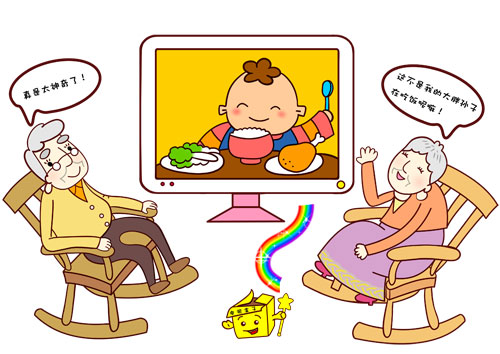(Han Qiao, Xinhua)Every time Ai Yuanxi(alias)turns on TV, the first pictures she sees are those from her son. He lives in Berlin and sends pictures of her 16-month-old grandson to her TV every day.
“It’s amazing that you can receive pictures on TV,” says the 65-year-old grandmother, who lives in east China’s Hangzhou city. “It’s handy and the pictures are way bigger than those on cell phones or computer screens. It’s like my grandson is right in front of me.”
Ai’s TV has a set-up box specially designed for the elderly. The TV has some computer functions, but the remote control pad makes it much easier to use.
And her neck and eyes will not suffer from her hours in front of the TV as they would from staring at a computer screen.
As China’s population ages, some Internet-based products are becoming more user-friendly for the elderly who are less familiar with the technology.
These smart products can help parents and their children maintain a comfortable distance, thus keeping close bonds without getting involved in each other’s life too much.

By Liu Chenxi
China has the largest elderly population in the world, with 222 million people aged at or above 60 by the end of last year, accounting for 16.1 percent of the total population, according to the Ministry of Civil Affairs.
The number of empty-nesters is rapidly growing with young people leaving their rural hometowns to seek opportunities in the city. In big cities, the problem is no less serious, but even more complicated, particularly among families with well-educated children, as their offspring go abroad.
Jiang Feng, founder of Judou Technology Company, says the buyers and users of the Judou TV box are different. The buyers are mostly in their 30s while the users are their parents who are in 60s.
“Many children feel sorry about leaving their parents. The device offers a way to stay connected,” Jiang says.
The box enables a young person to download a film from the Internet directly to their parents’ TV, which might be thousands of kilometers away. It also makes it possible for parents to video chat
Parents can video chat with family on TV while the children can answer video calls on their cell phones any time.
Jiang says old people are curious about new technology, just like young people, but the fear of being incompetent intimidates them. “So when designing products for them, my guiding principle is making them easy to use.”
Liu Bei (alias) aged 77 won’t let her husband take a walk by himself if he doesn’t wear a watch which can also be used as a cell phone – with a button for emergency calls – and a GPS.
Her 87-year-old husband, who has shown early signs of Alzheimer’s, fell once when taking a walk. He pushed the emergency button, sending an instant alert to the cell phones of Liu, Liu’s son and Liu’s daughter-in-law. Liu quickly ran downstairs and found him using the GPS tracker.
Her husband also has a number of chronic conditions. He needs to take tablets twice a day to treat hypertension and he suffers from an irregular heartbeat. When his heart accelerates, he can not take the tablets.
The Aiqiangua watch, a gift from their son, provides real-time data on his heart when he wears it, which they check before he takes his pills. “It is very smart. We love it,” Liu says.
The Chinese government has issued policies to encourage development of smart products to help address the challenges of the aging society.
Du Peng, professor of aging studies at Renmin University of China, says smart devices help the elderly through daily life, but the supply of products is insufficient and many are too complicated for seniors.
The next stage of development, says Du, should see smart devices connected to local medical and other services for the elderly. In a medical emergency, nearby medical centers could be informed immediately, speeding up the provision of help.
“That requires the effort of all of society, including the government, medical institutions and companies,” says Du.
Ai Yuanxi occasionally travels abroad. She has visited her son in Europe, and been to Egypt and the Republic of Korea. She stores her photos on the Judou box.
She often has the pictures of fond memories rolling across the TV screen accompanied by music. “It makes me feel very happy,” she says.
Du noted that “Innovation in smart technology helps the elderly live more interesting and dignified lives. ”
